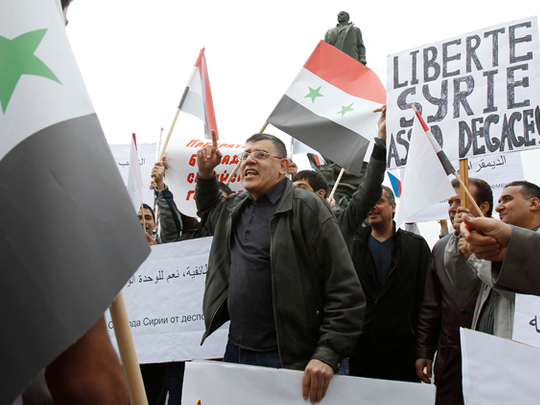
Damascus: Syrian forces arrested more dissidents Sunday in the flashpoint southern town of Daraa and in a Damascus suburb under siege for a week, after two days of fresh bloodshed, activists said.
Anti-regime protesters appealed for new protests to launch a "week of breaking the siege" imposed on Daraa and the Douma suburb, and other towns facing deadly crackdowns.
Six civilians were killed in Daraa on Saturday, after a day of massive protests in Syria, where rights groups say the civilian death toll from unprecedented protests that erupted March 15 has topped 580.
On Sunday, British Prime Minister David Cameron denounced Syria's repression, branding it "disgraceful and unacceptable," and called for more international pressure against Damascus.
The United States has blocked assets of embattled President Bashar Al Assad's brother, Maher, who commands the feared Fourth Armoured Division, as well as top officials and the infamous intelligence services.
The European Union is preparing a raft of sanctions, including an arms embargo.
Troops in tanks backed by other armoured vehicles cruised Daraa streets on Sunday, shooting to keep residents indoors and arresting men aged 15 and over, an activist from the town told AFP by telephone.
"Since early morning the army and security forces have been combing neighbourhoods one by one and making sweeping arrests. Hundreds have been arrested since Friday," said Abdullah Abizad.
In Douma, "the army has tightened the siege and has a list of 200 names of people it wants to arrest," another activist said.
"It appears the army has vowed not to leave Douma before arresting everyone on the list," the activist said, adding that scores have been rounded up already.
"There are also intermittent clashes in Douma between residents and the security forces, and there is a rumour that a member of the security forces was killed on Saturday," the activist said.
The Syrian Revolution 2011, a driving force behind the protests, vowed in a Facebook statement that "we will only kneel before God," and gave a daily schedule of protests in solidarity with the Daraa and Douma from Sunday.
The army said it entered Daraa last Monday at the request of residents to rid them of "terrorists gangs" responsible for a spate of killings and vandalism.
"The manhunt for terrorist groups has lead to the death of six of them and the arrest of 149 wanted people as well as the seizing of a quantity of arms," a military spokesman said on Saturday.
The spokesman said one soldier was killed and seven others wounded on Saturday in Daraa.
Water and power have been cut in Daraa as the situation worsened after 3,000-5,000 troops supported by tanks stormed the town at dawn last Monday.
Abizad said living conditions were worsening.
"The humanitarian situation is very dire. There is no water, no food, no electricity. There are six bodies on the streets since Friday and we cannot get to them because of the snipers. There are also wounded we cannot reach."
"The snipers shoot at everything that moved. We had a dog in our neighbourhood, a white dog, and they even shot him."
Activists were collecting signatures for a petition addressed to the health authorities urging the government to dispatch urgent medical and food supplies to Daraa's "women and children," one activist said.
The Committee of the Martyrs of the 15 March Revolution, which has been keeping a tally of the dead, put the toll since the start of protests at 582 civilians.
The London-based Syrian Observatory for Human Rights has a slightly lower toll of 545 civilians, adding that 86 army and security forces personnel have also been killed.
Activists say that more than 66 were reported killed on Friday alone in a "day of rage" against the regime. The authorities said nine members of the security forces were shot dead by "terrorist groups."
Scores of prominent human rights and opposition militants are also being rounded up despite the lifting last week of nearly five decades of emergency rule and the abolition of the repressive state security court.
Lawyer Hassan Esmail Abdel Azim was taken from his office on Saturday, the National Organisation for Human Rights in Syria said. At least 11 women who took part in a Damascus protest were also detained, an activist said.
Activists said countrywide protests would begin with demonstrations for Daraa on Sunday and around Damascus on Monday.
Rallies are planned on Tuesday in the northern towns of Banias and Jableh, Wednesday in Homs, Talbisseh and in Tall Kalakh on the border with Lebanon, and nationwide night vigils on Thursday.
Pressure against the embattled president from home and abroad increased as more members of Assad's ruling Baath party resigned to protest at the security crackdown, a new list of 138 names showed.
Britain's prime minister called for more pressure.
"It is a completely disgraceful and unacceptable situation to see this regime killing so many of its own people," Cameron told the BBC on Sunday.
"Clearly in Syria we need to do more to step up the pressure on that regime to show internationally this is not acceptable. We've started that process in the European Union but I think we have further to go and more to do."
UN agencies also acted against Damascus.
The UN Human Rights Council endorsed a US call for an investigative mission on the bloodshed while the UNDP said it was suspending work on a five-year aid programme for Syria.
Meanwhile, Turkey braced for an influx of refugees from neighbouring Syria, and its foreign minister expressed opposition to any foreign intervention.
"We should work to prevent the possibility (of a military intervention). Foreign intervention in a country like Syria with a heterogenous social structure might cause unwanted consequences," Ahmet Davutoglu was quoted by the Anatolia news agency as saying.
"We consider it very important that Syria should solve the issue by itself. The chance for this still exists so it should not be missed."












